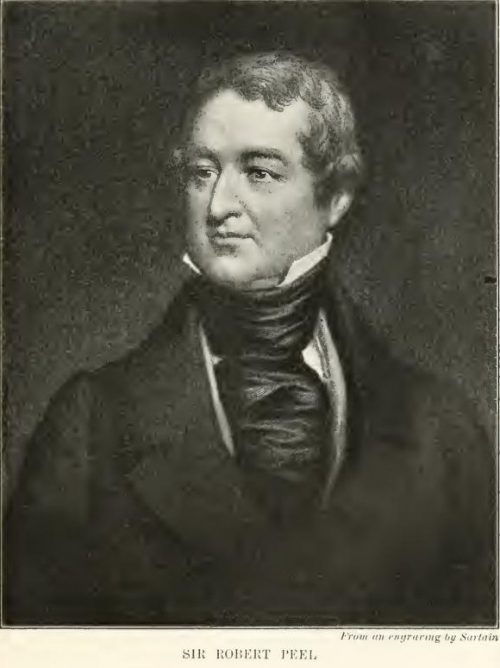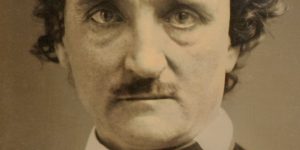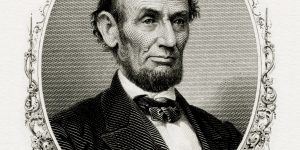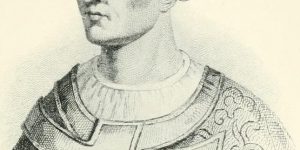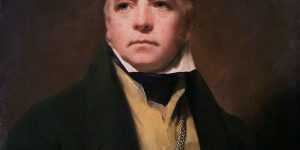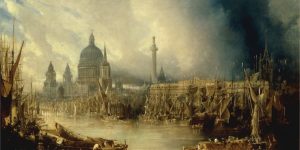Sir Robert Peel : Political Economy – Beacon Lights of History, Volume X : European Leaders by John Lord
Beacon Lights of History, Volume X : European Leaders
William IV : English Reforms
Sir Robert Peel : Political Economy
Cavour : United Italy
Czar Nicholas : The Crimean War
Louis Napoleon : The Second Empire
Prince Bismarck : The German Empire
William Ewart Gladstone : The Enfranchisement of the People
Beacon Lights of History, Volume X : European Leaders
by
John Lord
Topics Covered
Birth and education of Sir Robert Peel.
His conservative views.
His High Church principle.
Enters the Cabinet of Lord Liverpool.
Catholic Emancipation.
Resigns the representation of Oxford.
Member of Tamworth.
Opposes the Reform Bill.
Prime Minister in 1841.
Financial genius.
His sliding scale.
O’Connell’s death.
The Factory Question.
Renewed charter of the Bank of England.
Financial measure.
Maynooth Grant.
Agitation for Free Trade.
Anti-Corn Association.
Cobden and Bright.
Free Trade leagues.
Free Trade Hall in Manchester.
Peel converted to Free Trade.
Disraeli leader of the Protectionists.
His virulent assaults on Peel.
Abolition of the Corn Laws.
Irish Coercion Bill.
Fall of the Peel Ministry.
Peel’s great speech.
Chartist movement.
Its collapse.
Death of Sir Robert Peel.
Character of Sir Robert Peel.
Sir Robert Peel : Political Economy
1788-1850.
Among the great prime ministers of England Sir Robert Peel is to be classed. He ranks with Pitt, Canning, and Gladstone for his intellectual force, his services, and his patriotism. He was to England what Guizot and Thiers were to France,–a pre-eminent statesman, identified with great movements, learned, eloquent, and wise. He was a man of unsullied character, commanding the respect and veneration of superior minds,–reserved and cold, perhaps; not a popular idol like Fox and O’Connell, but a leader of men.
There was no man in his cabinet more gifted or influential than he. Lord Liverpool, Lord Melbourne, and Lord Aberdeen were placed in their exalted posts, not for remarkable abilities, but by the force of circumstances, for the purpose of uniting greater men than they in a coalition in order to form a strong government. Thus, Canning really was the master spirit in the cabinet of Lord Liverpool, as Lord Palmerston was in that of Lord Aberdeen. Peel, however, was himself the controlling intellect of the government of which he was the head, and was doubtless superior in attainments and political genius to Wellington, to Earl Grey, and Lord John Russell,–premiers like him, and prominent as statesmen. Lord Goderich, Lord Stanley, Lord Althorp, Sir James Graham, Mr. Goulburn, Lord Wharncliffe, Lord Howick, Earl Ripon, Mr. C. Wood, Mr. Macaulay, Mr. Croker, were all very able ministers, but not to be compared with Sir Robert Peel in shaping the destinies of the country. His administration was an epoch in English political history, to be long remembered as singularly successful and important.
Sir Robert Peel came from the people, although his father was a baronet and a very wealthy man, proud and aristocratic as he was rich. His riches were acquired by manufacturing cotton goods, like those of his father before him, whose business he inherited; but the great-grandfather of Sir Robert was a plain and unimportant cotton spinner in Lancashire, of no social rank whatever. No noble blood flowed in the veins of the great premier, nor was he ever ambitious of aristocratic distinction. He declined an earldom, though rich enough to maintain its rank. He accepted no higher social rank than what he inherited, and which came from successful business.
But Peel was educated with great care by an ambitious father. He was sent to Harrow and Christ Church, and was distinguished as a boy for his classical attainments, as was Canning before him. At an early age he reached all the honors that Oxford could bestow; and when he was only twenty-one was brought into Parliament for the close borough of Cashel, in Ireland, in the gift of some noble lord. He entered the House of Commons in 1809, at the same time with Palmerston, and a few years earlier than Lord John Russell, during that memorable period when Napoleon was in the midst of his victories, and when a noble constellation of English statesmen combined their energies for the good of their country,–Wilberforce, Wyndham, Tierney, Perceval, Grattan, Castlereagh, Canning, Romilly, Brougham, Mackintosh, Huskisson, and others,–all trained in the school of Pitt, Fox, or Burke, who had passed away. Among these great men Peel made his way, not so much by force of original genius–blazing and kindling like the eloquence of Canning and Brougham–as by assiduity in business, untiring industry, and in speech lucidity of statement, close reasoning, and perfect mastery of his subject in all its details. He was pre-eminently a man of facts rather than theories. Like Canning and Gladstone, he was ultra-conservative in his early political life,–probably in a great measure from his father’s example as well as from the force of his university surroundings,–and, of course, joined the Tory party, then all-powerful. So precocious were his attainments, and so promising was he from the force of his character, that at the age of twenty-four he was made, by Mr. Perceval, under-secretary for the Colonies; the year after (in 1812) he was promoted, by Lord Liverpool, to the more important post of secretary for Ireland. In the latter post he had to combat Canning himself in the matter of Catholic emancipation, but did his best to promote secular education in that priest-ridden and unhappy country. For his High Church views and advocacy of Tory principles, which he had been taught at Oxford, he was a favorite with the university; and in 1817 he had the distinguished honor of representing it in Parliament. In 1819 he made his financial reputation by advocating a return to specie payments,–suspended in consequence of the Napoleonic wars. In 1820 he was married to a daughter of General Sir John Floyd, and his beautiful domestic life was enhanced by his love of art, of science, of agriculture, and the society of eminent men. In 1822 he entered Lord Liverpool’s cabinet as home secretary; and when the ministry was broken up in 1827, he refused to serve in the new government under Canning, on account of the liberal views which the premier entertained in reference to Catholic emancipation.
The necessity of this just measure Sir Robert Peel was made to feel after Canning’s death, during the administration of the Duke of Wellington. Conservative as he was, and opposed to all agitations for religious or political change even under the name of “reform,” the fiery eloquence of O’Connell and the menacing power of the Catholic Association forced upon him the conviction of the necessity of Catholic emancipation, as the cold reasoning of Richard Cobden afterward turned him from a protectionist to a free-trader. He was essentially an honest man, always open to reason and truth, learning wisdom from experience, and growing more liberal as he advanced in years. He brought the Duke of Wellington to his views in spite of that minister’s inveterate prejudices, and the Catholics of Ireland were emancipated as an act of expediency and state necessity. Peel, although only home secretary under Wellington, was the prominent member of the administration, and was practically the leader of the House of Commons, in which character he himself introduced the bill for Catholic relief. This great service was, however, regarded by the ultra Tories as an act of apostasy, and Peel incurred so much reproach from his former friends that he resigned his seat as member for Oxford University, and accepted the constituency of Westbury. During this administration, too, Sir Robert, as home secretary, reorganized the police force of London (whence their popular nicknames of “Peelers” and “Bobbies”), and performed other important services.
In 1830 the Whigs came into power under Lord Grey, and for ten years, with the brief interval of his first administration, Sir Robert Peel was the most able leader of the opposition. In 1833 he accepted the parliamentary membership for Tamworth, which he retained to the end of his great career. He persistently opposed the Reform Bill in all its stages; but when it was finally passed, he accepted it as unmistakably the will of the nation, and even advocated many of the reforms which grew out of it. In 1841 he again became prime minister, in an alarming financial crisis; and it was his ability in extricating the nation from financial difficulties that won for him general admiration.
Thus for thirty years he served in Parliament before he reached the summit of political ambition,–half of which period he was a member of the ministry, learning experience from successive administrations, and forging the weapons by which he controlled the conservative party, until his conversion to the doctrines of Cobden again exposed him to the bitter wrath of the protectionists; but not until he had triumphantly carried the repeal of the corn laws,–the most important and beneficent act of legislation since the passage of the Reform Bill itself.
It was this great public service on which the fame of Sir Robert Peel chiefly rests; but before we can present it according to its Historical importance, we must briefly glance at the financial measures by which he extricated his country from great embarrassments, and won public confidence and esteem. He did for England what Alexander Hamilton did for the United States in matters of finance, although as inferior to Hamilton in original genius as he was superior to him in general knowledge and purity of moral character. No one man can be everything, even if the object of unbounded admiration. To every great man a peculiar mission is given,–to one as lawgiver, to another as conqueror, to a third as teacher, to a fourth as organizer and administrator; and these missions, in their immense variety, constitute the life and soul of history. Sir Robert Peel’s mission was that of a financier and political economist, which, next to that of warrior, brings the greatest influence and fame in a commercial and manufacturing country like England. Not for lofty sentiments, such as Burke uttered on the eve of the French Revolution, are the highest rewards given in a material country like that of our ancestors, but for the skill a man shows in expounding the way in which a nation may become prosperous and rich. It was Sir Robert Peel’s mission to make England commercially prosperous, even as it was that of Brougham and Russell to give it liberty and political privileges, that of Pitt and Castlereagh to save it from foreign conquest, and that of Wilberforce to rescue it from the disgrace and infamy of negro slavery.
Sir Robert Peel came into power in 1841, the Russell Whig ministry having failed to satisfy the country in regard to financial questions. There had been an annual deficit, and the distress of both the agricultural and manufacturing classes was alarming. The new premier proceeded with caution in the adoption of measures to relieve the burdens of the people and straighten out the finances, which were in great disorder. His first measure had reference to the corn laws, for the price of food in England was greater than in other European countries. He finally proposed to the assembled Parliament, in 1842, to make an essential alteration in the duties; and instead of a fixed duty he introduced a sliding scale, by which the duty on corn should be thirteen shillings a quarter[2] when the price was under sixty shillings, increasing the duty in proportion as the price should fall, and decreasing it as the price should rise,–so that when the price of corn was under fifty shillings the duty should be fixed at twenty shillings, and when the price was above seventy-three the duty should be only a shilling a quarter. This plan, after animated discussion, was approved; for although protection still was continued, the tendency of the measure was towards free-trade, for which the reformers were clamoring. Notwithstanding this measure, which was triumphantly carried through both Houses, the prevailing distress continued, and the revenue was steadily diminishing. To provide revenue, Peel introduced an income tax of seven pence in the pound, to stand for three years; and to offset that again lowered the import duties on domestic animals, dairy products, other articles of food, and some drugs.
When Parliament assembled in 1843 the discussions centred on free-trade. Sir Robert Peel and Mr. Gladstone and Sir James Graham admitted the general soundness of the principles of free-trade, but felt that the time had not yet come for their adoption, fearing an increased distress among the agricultural population. At that time, and for a long period before, the interests of agriculture were regarded as paramount, and those of manufacturing secondary; but, as time passed, it was generally felt that reduced taxes on all the necessities of life were imperative. Fifty years earlier, England produced corn enough for all the wants of the country; but with a population increasing at the rate of two hundred thousand a year, it was obvious that the farmers could not supply the demand. In consequence of which, at then existing tariffs, bread became yearly still dearer, which bore hard on the manufacturing operatives.
The year 1844 opened under happier auspices. The financial measures of the government had answered public expectations, and changed the growing deficiency into an increasing surplus. Improvements in machinery had increased the gains of the manufacturers; a war in India had been terminated successfully, and England was at peace with all the world. The only formidable troubles were in Ireland,–the standing difficulty with all administrations, Conservative or Liberal, and which no administration has ever been able to surmount. Sir Robert Peel had hoped that the Catholic Emancipation Act would lead to the tranquillity of Ireland. But that act did not content the Irish reformers. The fiercest agitation was conducted by O’Connell for the repeal of the Union itself and the restoration of the Irish parliament. At bottom, the demands of the great agitator were not unreasonable, since he demanded equal political privileges for both Ireland and England if the Union should continue,–that, in short, there should be one law for both countries. But since the ministry insisted on governing Ireland as a foreign and conquered country, denying equality of rights, the agitation grew to fearful proportions, chiefly in the shape of monster meetings. At last the government determined on the prosecution of O’Connell and some others for seditious conspiracy, and went so far as to strike off the name of every Catholic on the jury which was to try him. The trial lasted twenty-four days, and the prisoners were convicted. The hard and unjust sentence on O’Connell himself was imprisonment for twelve months and a fine of two thousand pounds. Against this decision an appeal was made to the House of Lords, and the judgment of the court was reversed. But the old man had already been imprisoned several weeks; his condemnation and imprisonment had told on his rugged constitution. He was nearly seventy years of age, and was worn out by excitement and unparalleled labors; and although he tried to continue his patriotic work, he soon after sickened, and in 1847 died on his way to Rome in search of rest.
O’Connell’s death did not end the agitations, which have continued from that time to this with more or less asperity, and probably will continue until justice shall be done to Ireland. It is plain that either Ireland should be left free to legislate for herself, which would virtually be the dismemberment of the empire; or should receive equal privileges with the English; or should be coerced with an iron hand, which would depopulate the country. It would seem that Ireland, if it is to form part of the empire,–not as a colony, but an integral part, like the different States of the American Union,–should be governed by the same laws that England has, and enjoy the same representation of its population. Probably there never will be order or tranquillity in the island until it shall receive that justice which the prejudices of the English will not permit them at present to grant,–so slow are all reforms which have to contend with bigotry, ignorance, and selfishness. The chain which binds nations and communities together must be a chain of love, without reference to differences in color, religion, or race.
In the session of 1844 the factory question occupied a large share of public attention. Lord Ashley, whose philanthropic aims commanded great respect, contended for a limitation of the hours of labor. The ministry insisted upon twelve hours; but Lord Ashley carried his measure, with some amendments, the government being brought over to the side of humanity. The result was that the working-hours of children under thirteen was limited to six and a half hours, and the amount of fines imposed for a violation of the laws was lowered; while a provision was made for the instruction of children employed in the mills of three hours in summer, and two and a half in the winter.
The confidence in the government showed itself in the rise of public securities, so that it became practicable to reduce the interest on consols (the consolidated government debt) from three and a half to three percent, by which a saving accrued to the country of £1,250,000, indicating general prosperity. The income increased with the revival of trade and commerce, and the customs alone increased to nearly £2,500,000, chiefly from duties on tea and sugar, which increasing prosperity enabled the poorer classes to use more freely. The surplus of the revenue amounted to over £4,000,000 sterling, owing largely to the income tax, which now the ministers proposed to reduce. The charter of the Bank of England was renewed in a form which modified the whole banking system in England. The banking business of the Bank was placed on the same footing with other institutions as to its power of issuing notes, which beyond a certain amount should depend on the amount of bullion in the Bank. Substantially, this was the same principle which Daniel Webster advocated in the United States Senate,–that all bank-notes should be redeemable in gold and silver; in other words, that a specie basis is the only sound principle, whether in banking operations or in government securities, for the amount of notes issued. This tended to great stability in the financial world, as the Bank of England, although a private joint-stock association, has from its foundation in 1694 been practically the fiscal agent of the government,–having the management of the public debt, paying dividends upon it, holding the government moneys, making advances when necessary, helping the collection of the public revenue, and being the central bank of the other banks.
In addition to the financial measures by which Sir Robert Peel increased the revenues of the country, and gave to it a greater degree of material prosperity than it had enjoyed during the century, he attempted to soothe the Catholics of Ireland by increasing the grant to the Roman Catholic College of Maynooth, in Ireland; indeed, he changed the annual grant to a permanent endowment, but only through a fierce opposition. He trebled the grant for national education, and exhibited increasing liberality of mind as he gained experience. But his great exploit was the repeal of the corn laws, in a Parliament where more than three quarters of the members represented agricultural districts, and were naturally on the side of a protection of their own interests. In order to appreciate more clearly the magnitude of this movement, we must trace it from the beginning.
The centre of agitation for free-trade, especially in breadstuff’s, was Manchester,–the second city of the kingdom for wealth, population, and influence, taking in the surrounding towns,–a very uninteresting place to the tourist and traveller; dingy, smoky, and rainy, without imposing architecture or beautiful streets; but a town of great intellectual activity in all matters pertaining to industrial enterprise and economical science,–the head centre of unpoetical materialism, where most of the well-to-do people dined at one o’clock.
As soon as this town was permitted to send members to Parliament it selected eminent free-traders,–Poulett Thomson and Mark Phillips,–who distinguished themselves for the fearlessness of their speeches on an unpopular subject. The agitation in Parliament had begun in 1836, at a period of great depression in all kinds of business and consequent suffering among the poor; but neither London nor the House of Commons was so favorable to the agitation of the principles of free-trade as Manchester was, and the subject began to be discussed throughout the country. An unknown man by the name of Poulton was the first to gain attention by his popular harangues; and he was soon followed by Richard Cobden,–a successful calico printer.
An Anti-Corn-Law Association was started by these pioneers, and £1,800 were raised by small subscriptions to enlighten the people on the principles of free-trade, when protection was the settled policy of the government. The Association was soon after reinforced by John Bright, an exceedingly brilliant popular orator, who was rich enough to devote a large part of his time to the spread of his opinions. Between him and Cobden a friendship and cordial co-operation sprang up, which lasted to the death of the latter. They were convinced that the cause which they had so much at heart could be effectually advanced only by the widest dissemination of its principles by public meetings, by tracts and by lectures. It was their aim to change public opinion, for all efforts would be in vain unless the people–and especially their leaders–were enlightened on the principles they advocated. They had faith in the ultimate triumph of these principles because they believed them to be true. From simple faith in the power of truth they headed the most tremendous agitation known in England since the passage of the Reform Bill. It was their mission to show conclusively to all intelligent people that it was for the interest of the country to abolish the corn laws, and that the manufacturing classes would be the most signally benefited. To effect this purpose it was necessary to raise a large sum of money; and the friends and advocates of the movement most liberally subscribed to circulate the millions of tracts and newspapers which the Association scattered into every hamlet and private family in England, besides the members personally giving their time and effort in public speeches and lectures in all parts of the country. “It was felt that the battle of free-trade must be fought first by the conversion of individuals, then at the hustings, and lastly in the House of Commons.”
The principle of protecting the country against the importation of foreign breadstuffs was upheld as fostering the agricultural interests, as inciting the larger cultivation of poor lands, as providing against dangerous dependence on foreign countries, and as helping the large landowners and their tenants to patronize manufactures and trade; so that, although the high prices of breadstuffs were keeping vast numbers of people in misery and the country on the edge of revolution, the protectionist doctrine was believed in religiously by the laboring classes, the small shopkeepers, nearly all the educated classes, and a large majority of the members of Parliament.
To combat this unshaken traditional belief was a gigantic undertaking. It was the battle of reason and truth against prejudice and bigotry,–the battle of a new enlightenment of general interests against the selfishness of unenlightened classes. While Villiers and Thomson appealed to members in the House of Commons, Cobden and Bright with still greater eloquence directly addressed the people in the largest halls that could be found. In 1838 Cobden persuaded the Chamber of Commerce in Manchester to petition Parliament for a repeal of the duties on corn. In 1839, the agitation spreading, petitions went up from various parts of the country bearing two million signatures. The motion to repeal, however, was lost by a large majority in the Commons. Then began the organization of Free-Trade Leagues. In 1841 a meeting in Manchester was held, at which were present seven hundred nonconformist ministers, so effectually had conversions been made among intelligent men. Nor did the accession of the conservative Sir Robert Peel to power discourage the agitators, for in the same year (1841) Cobden was sent to Parliament. Meetings were still more frequently held in all the towns of the kingdom, A bazaar held in favor of the cause in the Theatre Royal, Manchester, in 1842, produced a clear profit of £10,000. In 1843 the great Free-Trade Hall was opened in Manchester, built expressly for public meetings for the anti corn-law agitation, and the sum of £150,000 was raised by private subscription to disseminate knowledge. At last, recognizing with keen instinct the inevitable turn in public opinion, the “Times” came out with a leading article of great power, showing a change of views on the subject of protection. Great noblemen, one after another, joined the League, and the Marquis of Westminster contributed £500 to the cause.
The free-trade movement was now recognized as a great fact which it was folly to ignore. Encouraged by the constant accession to the ranks of reform, the leaders of the League turned their attention to the registration of voters, by which many spurious claims for seats were annulled, and new members of Parliament were chosen to advocate free-trade. At last, in 1846, Sir Robert Peel himself, after having been for nearly his whole career a protectionist, gave in his adhesion to the new principles. Cobden, among others, had convinced him that the prosperity of the country depended on free-trade, and he nobly made his recantation, to the intense disgust of many of his former followers,–especially of Disraeli, who now appears in Parliament as a leader of the protectionists.
This brilliant man, who in 1837, at the age of thirty-two, took his seat in Parliament, had made no impression in that body for several years; but having learned from early failures his weak points, and by careful study of the successes of others trained himself to an effective style of parliamentary speech, he became, at the critical time of Peel’s change of front, the representative of Shrewsbury, and gradually organized about himself the dissatisfaction and indignation of the landed proprietors with Sir Robert Peel’s concessions to the free-trade movement. His strictures on Peel were severe, caustic, and bitter. “What,” said this eloquent speaker, “shall we think of the eminent statesman, who, having served under four sovereigns, who, having been called to steer the ship on so many occasions and under such perilous circumstances, has only during the last three or four years found it necessary entirely to change his convictions on that most important topic, which must have presented itself for more than a quarter of a century to his consideration? I must, sir, say that such a minister may be conscientious, but he is unfortunate…. It is all very well for the right honorable gentleman to come forward and say, ‘I am thinking of posterity; my aim is heroic; and, appealing to posterity, I care neither for your cheers nor for your taunts,’ It is very well for the right honorable gentleman to take this high-flying course, but I can but say that my conception of a great statesman is one who represents a great idea,–I do not care whether he is a manufacturer or a manufacturer’s son. I care not what may be the position of a man who never originates an idea,–a watcher of the atmosphere,–a man who, as he says, ‘takes his observations,’ and when he finds the wind in a certain quarter trims his sails to suit it. Such a man may be a powerful minister, but he is no more a great statesman than a man who gets up behind a carriage is a great whip.”
All this tirade was very unjust,–though it pleased the protectionists,–for Sir Robert Peel was great enough to listen to arguments and reason, and give up his old sentiments when he found them untenable, even if he broke up his party. His country was greater in his eyes than any party.
As prime minister, Peel then unfolded his plans. He announced his intention to abandon the sliding scale entirely, and gradually reduce the duty on corn and other articles of necessity so that at the end of three or four years the duty would be taken off altogether. This plan did not fully satisfy the League, who argued for immediate repeal. Indeed, there was a necessity. The poor harvests in England and the potato-rot in Ireland were producing the most fearful and painful results. A large part of the laboring population was starving. Never before had there been greater distress. On the 2d of March, 1846, the ministerial plan had to go through the ordeal of a free-trade attack. Mr. Villiers proposed an amendment that would result in the immediate and total repeal of the corn laws. Nevertheless, the original bill passed the Commons by a majority of ninety-eight.
It was at once carried to the House of Lords, where it encountered, as was expected, the fiercest opposition, no less than fifty-three lords taking part in the discussion. The Duke of Wellington, seeing that the corn laws were doomed, and that further opposition would only aggravate the public distress, supported the bill, as did Lord Aberdeen and other strong conservatives, and it was finally carried by a majority of forty-seven.
Before the bill for the virtual repeal of the corn laws was passed by the House of Lords, the administration of Sir Robert Peel abruptly closed. An Irish coercion bill had been introduced by the government, not very wisely, even while the corn bill was under discussion by the Commons. The bill was of course opposed by the Irish followers of O’Connell, and by many of the Liberal party. The radical members, led by Cobden and Bright, were sure to oppose it. The protectionists, full of wrath, and seeing their opportunity to overthrow the government, joined the Liberals and the Irish members, and this coalition threw out the bill by a majority of seventy-three. The government of course resigned.
Nor was the premier loath to throw off his burdens amid calumny and reproach. He cheerfully retired to private life. He concluded the address on his resignation, after having paid a magnificent tribute to Cobden–by whose perseverance, energy, honesty of conviction, and unadorned eloquence the great corn-law reform had been thus far advanced–in these words: “In quitting power, I shall leave a name severely blamed, I fear, by many men, who, without personal interest but only with a view of the public good, will bitterly deplore the rupture of party ties, from a belief that fidelity to party engagements and the maintenance of great parties are powerful and essential means of government. [I fear also] that I shall be blamed by others who, without personal interest, adhere to the principles of protection, which they regard as necessary to the prospects of the country; that I shall leave a name detested by all monopolists, who, from less honorable motives, claim a protection by which they largely profit. But I shall perhaps leave a name which will sometimes be pronounced by expressions of good-will by those whose lot in this world is to labor, who in the sweat of their brow eat their daily bread; and who may remember me when they renew their strength by food at once abundant and untaxed, and which will be the better relished because no longer embittered by any feeling of injustice.” He then resumed his seat amidst the loudest applause from all sides of the House; and when he left Westminster Hall, leaning on the arm of Sir George Clark, a vast multitude filled the street, and with uncovered heads accompanied him in respectful silence to the door of his house.
Sir Robert Peel continued to attend the meetings of Parliament as an independent member, making no factious opposition, and giving his support to every measure he approved,–more as a sage than a partisan, having in view mainly the good of the country whose government he no longer led.
It was soon after Peel’s retirement from office that O’Connell, too, made his last speech in the House of Commons, not as formerly in trumpet tones, but with enfeebled voice. “I am afraid,” said the fainting athlete, “that the House is not sufficiently aware of the extent of the misery in Ireland. I do not think that members understand the accumulated miseries under which the people are at present suffering. It has been estimated that five thousand adults and ten thousand children have already perished with famine, and that twenty-five per cent of the whole population will perish, unless the House will afford effective relief. I assure the House most solemnly that I am not exaggerating; I can establish all that I have said by many and painful proofs. And the necessary result must be typhus fever, which in fact has already broken out, and is desolating whole districts; it leaves alive only one in ten of those whom it attacks.” This appeal doubtless had its effect in demonstrating the absolute need of a repeal of the corn laws. But it is as the “liberator” of the Roman Catholic population of Ireland in the great emancipation struggle,–triumphantly concluded as early as 1829,–and the incessant labors after that for the enlargement of Irish conditions, that O’Connell will be remembered. “Honor, glory, and eternal gratitude,” exclaimed Lacordaire, “to the man who collected in his powerful hand the scattered elements of justice and deliverance, and who, pushing them to their logical conclusions with a vigorous patience which thirty years could not exhaust, at last poured on his country the unhoped-for delight of liberty of conscience, and thus deserved not only the title of Liberator of his Country but the oecumenical title of Liberator of his Church.”
O’Connell, Cobden, and Sir Robert Peel,–what great names in the history of England in the agitating period between the passage of the Reform Bill and that of the repeal of the corn laws! I could add other illustrious names,–especially those of Brougham and Lord John Russell; but the sun of glory around the name of the first was dimmed after his lord chancellorship, while that of the latter was yet to blaze more brightly when he assumed the premiership on the retirement of his great predecessor, with such able assistants as Lord Palmerston, Earl Grey, Macaulay, and others. These men, as Whigs, carried out more fully the liberal and economic measures which Sir Robert Peel had inaugurated amid a storm of wrath from his former supporters, reminding one of the fury and disappointment of the higher and wealthy classes when Mr. Gladstone–a still bolder reformer, although nursed and cradled in the tenets of monopolists–introduced his measures for the relief of Ireland.
During the administration of Sir Robert Peel there was another agitation which at one time threatened serious consequences, but as it came to nothing it has not the historical importance of the Anti-Corn-Law League. It was a fanatical uprising of the lower classes to obtain still greater political privileges, led by extreme radicals, of whom Mr. Feargus O’Connor was the most prominent leader, and Mr. Henry Vincent was the most popular speaker. The centre of this movement was not Manchester, but Birmingham. The operatives of Manchester wanted cheaper bread; those of Birmingham wanted an extension of the franchise: and as Lord John Russell had opposed the re-opening of the reform question, the radicals were both disappointed and infuriated. The original leaders of parliamentary reform had no sympathy with such a rabble as now clamored for extended reform. They demanded universal suffrage, annual Parliaments, vote by ballot, abolition of property qualifications, payment of members of Parliament, and the division of the country into equal electoral districts. These were the six points of the people’s charter,–not absurd to the eyes of Americans, but utterly out of the question in such an aristocratic country as England, and advocated only by the working-classes and their incendiary leaders. Discontent and misery were the chief causes of the movement, which was managed without ability. The agitation began in 1836 and continued to 1848. At first the government allowed it, so far as it was confined to meetings, speeches, and the circulation of tracts,–knowing full well that, as it made no appeal to the influential and intelligent classes, it would soon expend itself. I was lecturing at the time in Birmingham, and the movement excited contempt rather than alarm among the people I met. I heard Vincent two or three times in his chapel,–for I believe he was educated as a dissenting minister of some sort,–but his eloquence made no impression upon me; it was clever and fluent enough, but shallow and frothy. At last he was foolishly arrested by the government, who had really nothing to fear from him, and imprisoned at Newport in Wales.
In England reforms have been effected only by appeals to reason and intelligence, and not by violence. Infuriated mobs, successful in France in overturning governments and thrones, have been easily repressed in England with comparatively little bloodshed; for power has ever been lodged in the hands of the upper and middle classes, intolerant of threatened violence. In England, since the time of Cromwell, revolutions have been bloodless; and reforms have been gradual,–to meet pressing necessities, or to remove glaring injustice and wrongs, never to introduce an impractical equality or to realize visionary theories. And they have ever been effected through Parliament. All popular agitations have failed unless they have appealed to reason and right.
Thus the People’s Charter movement, beginning about 1838, was a signal failure, because from the practical side it involved no great principles of political economy, nothing that enriches a nation; and from the side of popular rights it was premature, crude, and represented no intelligent desire on the part of the people. It was a movement nursed in discontent, and carried on with bitterness and illegal violence. It was wild, visionary, and bitter from the start, and arose at a period when the English people were in economic distress, and when all Europe was convulsed with insurrectionary uprisings, and revolutionary principles were mixed up with socialism and anarchy. The Chartist agitation continued with meetings and riots and national conventions until 1848, when the Revolution in France gave a great impulse to it.
At last some danger was apprehended from the monster meetings and inflammatory speeches of the Chartists, and government resolved to suppress the whole movement by the strong arm. The police force throughout the kingdom was strengthened, and one hundred and seventy thousand special constables were sworn in, while extensive military preparations were intrusted to the Duke of Wellington. The Chartists, overrating their strength, held a great meeting on Kensington Common, and sent a petition of more than five millions of names to the House of Commons; but instead of half a million who were expected to assemble on the Common with guns and pikes, only a few thousand dared to meet, and the petition itself was discovered to be forged, chiefly with fictitious names. It was a battle on the part of the agitators without ball cartridges, in which nothing was to be seen but smoke. Ridicule and contempt overwhelmed the leaders, and the movement collapsed.
Although the charter failed to become law, the enfranchisement of the people has been gradually enlarged by Parliament in true deliberate English fashion, as we shall see in future lectures. Perhaps the Chartist movement may have ripped up the old sod and prepared the soil for the later peaceful growth; but in itself it accomplished nothing for which it was undertaken.
The repeal of the corn laws in 1846 was followed, as was the Reform Bill of 1832, by a series of other reforms of a similar kind,–all in the direction of free-trade, which from that time has continued to be the established principle of English legislation on all the great necessities of life. Scarcely had Lord John Russell in 1846 taken the helm of state, when the duties on sugar were abolished, no discrimination being shown between sugar raised in the British colony of Jamaica and that which was raised in Cuba and other parts of the world. The navigation laws, which prohibited the importation of goods except in British ships, or ships which belonged to the country where the goods were produced, were repealed or greatly modified. The whole colonial system was also revised, especially in Canada; and sanitary measures were taken to prevent disease in all the large towns of the country.
In the midst of these various reforms, which the government under Lord John Russell prosecuted with great zeal and ability, and by which a marked improvement took place in the condition of the people, Sir Robert Peel was thrown from his horse in London, June 29, 1850, and survived but a few days. His accidental death created universal lamentation, for everybody felt that a great national loss had occurred. In spite of the bitterness of the monopolists, disappointed in their gains, no death was ever more seriously and universally lamented in England. Other statesmen blazed upon their contemporaries with more brilliant original genius than Peel, but no one ever had more force of character than he, or was more respected for his candor, truthfulness, and patriotism. If he had not the divination to originate, he showed transcendent ability in appropriating and making his own the worthy conceptions of others. He was among those few statesmen who are willing to renounce the dearest opinions of youth and the prejudices of manhood when convinced of their unsoundness.
Peel was a great administrator and a great debater. His character was austere, his temperament was cold, his manners were awkward and shy; he was chary in the bestowal of pensions and rewards; and by reason of his rather unsympathetic nature he never was a favorite with artists and literary men. It was his conviction that literary men were not sufficiently practical to be intrusted with political office. Hence he refused to make Monckton Milnes an under-secretary of state. When Gladstone published his book on Church and State, being then a young man, it is said that Peel threw it contemptuously on the floor, exclaiming, “What a pity it is that so able a man should injure his political prospects by writing such trash!” Nor was Peel sufficiently passionate to become a great orator like O’Connell or Mirabeau; and yet he was a great man, and the nation was ultimately grateful for the services he rendered to his country and to civilization. Had his useful and practical life been prolonged, he probably would again have taken the helm of state. He was always equal to the occasion; but no occasion was sufficiently great to give him the éclat which Pitt enjoyed in the wars of Napoleon. Under the administration of Peel the country was at peace, and no such internal dangers threatened it as those which marked the passage of the Reform Bill.
Sir Robert Peel was one of the most successful ministers that England ever had. Certainly no minister was ever more venerated than he; and even the Duke of Wellington did nothing without his advice and co-operation. In fact, he led the ministry of the duke as Canning did that of the Earl of Liverpool; and had he been less shy and reserved, he would not have passed as so proud a man, and would have been more popular. There is no trait of character in a great man less understood than what we call pride, which often is not pride at all, but excessive shyness and reserve, based on sensitiveness and caution rather than self-exaggeration and egotism.
Few statesmen have done more than Peel to advance the material interests of the people; yet he never was a popular idol, and his history fails to kindle the enthusiasm with which we study the political career of Pitt or Canning or Disraeli or Gladstone. He was regarded as a great potentate rather than as a great genius; and he loved to make his power felt irrespective of praise or censure from literary men, to whom he was civil enough, but whose society he did not court. Politics were the element in which he lived, and politicians were his chief associates outside the family circle, which he adorned. And yet when distinguished merit in the Church or in the field of literature was brought to his notice, he was ready to reward it.
As a proof of the growing fame of Sir Robert Peel, no less than three biographies of him have lately been issued from the Press. Such, after a lapse of forty years, indicates the lasting reputation he has won as a statesman; but as a statesman only. He filled no other sphere. He was not a lawyer like Brougham; not a novelist like Beaconsfield; not a historian like Macaulay; not an essayist and reviewer like Gladstone. He was contented to be a great parliamentary leader alone.
Authorities.
Molesworth’s History of England; Miss Martineau’s History of England; Justin McCarthy’s Life of Sir Robert Peel; Alison’s History of Europe,–all of which should be read in connection with the Lives of contemporary statesmen, especially of Cobden, Bright, and Lord John Russell. The Lives of foreign statesmen shed but little light, since the public acts of Sir Robert Peel were chiefly confined to the domestic history of England.
[2] “The fourth of a ton in weight, or eight bushels of grain.”

